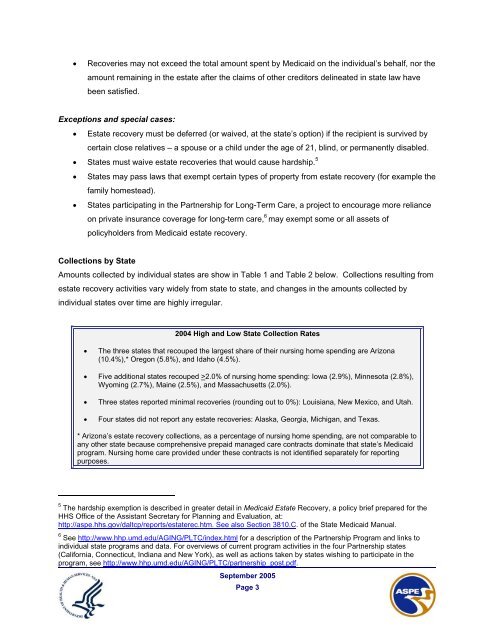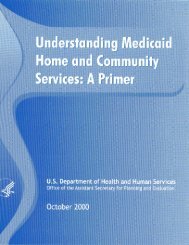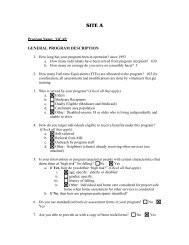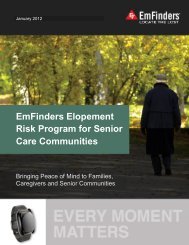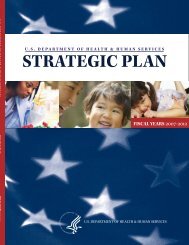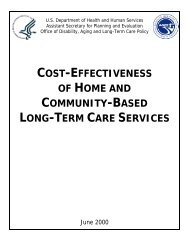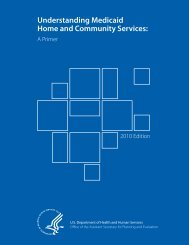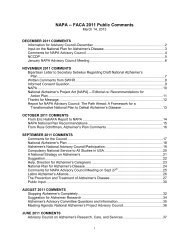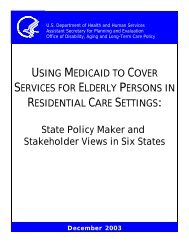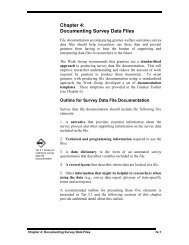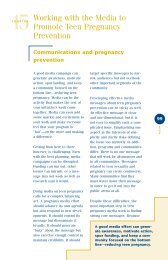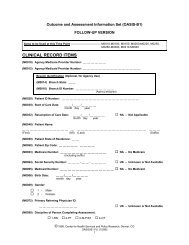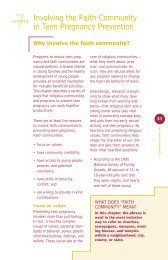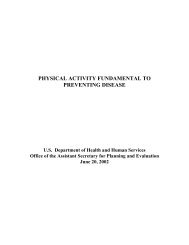Medicaid estate recovery collections - ASPE - U.S. Department of ...
Medicaid estate recovery collections - ASPE - U.S. Department of ...
Medicaid estate recovery collections - ASPE - U.S. Department of ...
You also want an ePaper? Increase the reach of your titles
YUMPU automatically turns print PDFs into web optimized ePapers that Google loves.
• Recoveries may not exceed the total amount spent by <strong>Medicaid</strong> on the individual’s behalf, nor theamount remaining in the <strong>estate</strong> after the claims <strong>of</strong> other creditors delineated in state law havebeen satisfied.Exceptions and special cases:• Estate <strong>recovery</strong> must be deferred (or waived, at the state’s option) if the recipient is survived bycertain close relatives – a spouse or a child under the age <strong>of</strong> 21, blind, or permanently disabled.• States must waive <strong>estate</strong> recoveries that would cause hardship. 5• States may pass laws that exempt certain types <strong>of</strong> property from <strong>estate</strong> <strong>recovery</strong> (for example thefamily homestead).• States participating in the Partnership for Long-Term Care, a project to encourage more relianceon private insurance coverage for long-term care, 6 may exempt some or all assets <strong>of</strong>policyholders from <strong>Medicaid</strong> <strong>estate</strong> <strong>recovery</strong>.Collections by StateAmounts collected by individual states are show in Table 1 and Table 2 below. Collections resulting from<strong>estate</strong> <strong>recovery</strong> activities vary widely from state to state, and changes in the amounts collected byindividual states over time are highly irregular.2004 High and Low State Collection Rates• The three states that recouped the largest share <strong>of</strong> their nursing home spending are Arizona(10.4%),* Oregon (5.8%), and Idaho (4.5%).• Five additional states recouped >2.0% <strong>of</strong> nursing home spending: Iowa (2.9%), Minnesota (2.8%),Wyoming (2.7%), Maine (2.5%), and Massachusetts (2.0%).• Three states reported minimal recoveries (rounding out to 0%): Louisiana, New Mexico, and Utah.• Four states did not report any <strong>estate</strong> recoveries: Alaska, Georgia, Michigan, and Texas.* Arizona’s <strong>estate</strong> <strong>recovery</strong> <strong>collections</strong>, as a percentage <strong>of</strong> nursing home spending, are not comparable toany other state because comprehensive prepaid managed care contracts dominate that state’s <strong>Medicaid</strong>program. Nursing home care provided under these contracts is not identified separately for reportingpurposes.5 The hardship exemption is described in greater detail in <strong>Medicaid</strong> Estate Recovery, a policy brief prepared for theHHS Office <strong>of</strong> the Assistant Secretary for Planning and Evaluation, at:http://aspe.hhs.gov/daltcp/reports/<strong>estate</strong>rec.htm. See also Section 3810.C. <strong>of</strong> the State <strong>Medicaid</strong> Manual.6 See http://www.hhp.umd.edu/AGING/PLTC/index.html for a description <strong>of</strong> the Partnership Program and links toindividual state programs and data. For overviews <strong>of</strong> current program activities in the four Partnership states(California, Connecticut, Indiana and New York), as well as actions taken by states wishing to participate in theprogram, see http://www.hhp.umd.edu/AGING/PLTC/partnership_post.pdf.September 2005Page 3


